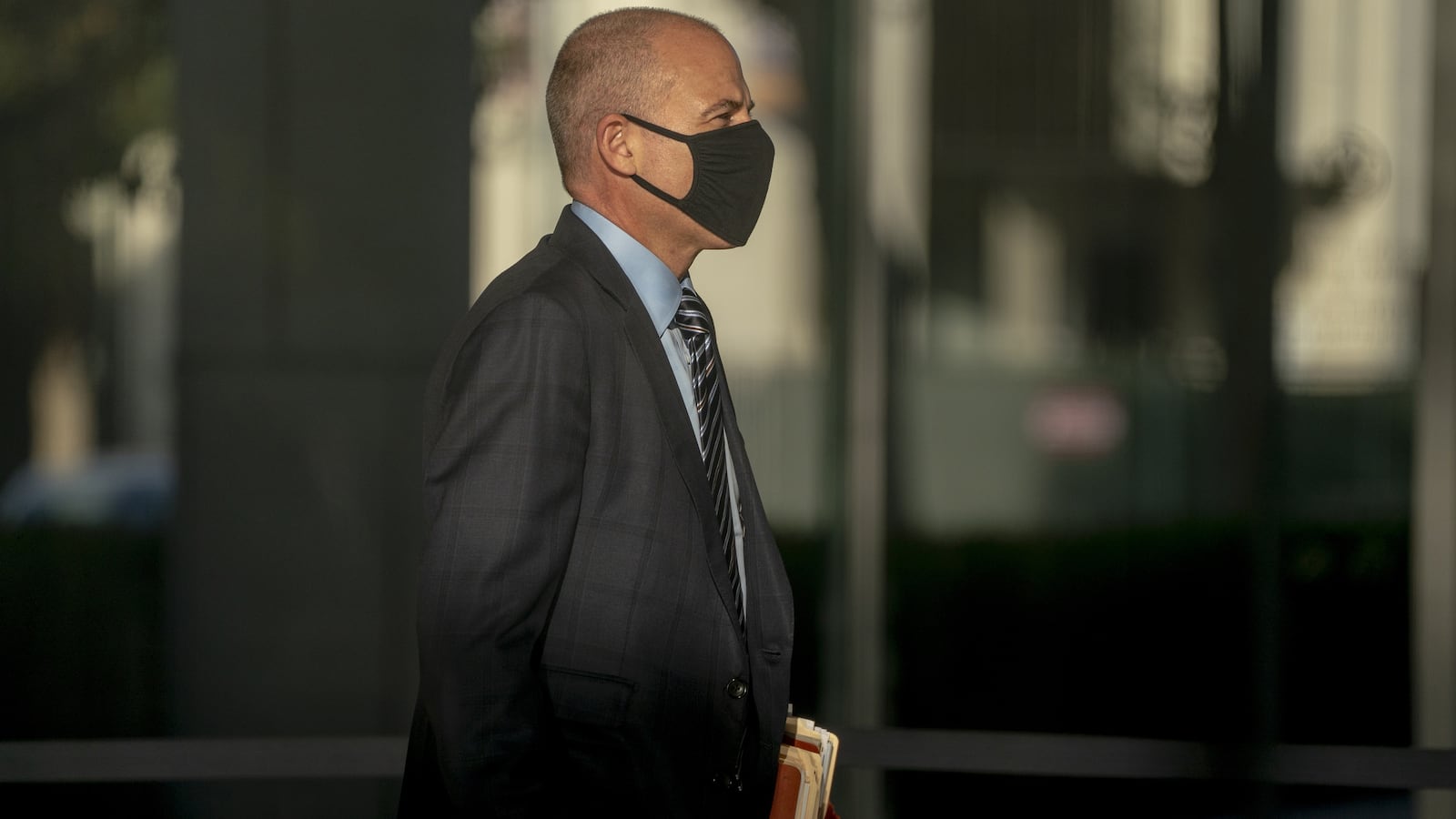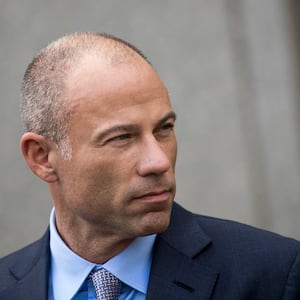SANTA ANA, California—On Wednesday morning, Michael Avenatti walked into a federal courthouse flanked by lawyers to face trial for allegedly embezzling millions in settlement proceeds from a handful of his own clients.
The twist: Despite the presence of his own legal eagles, the disgraced attorney was representing himself, and putting his trademark self-righteousness on robust display.
Three years ago, Avenatti was accustomed to suiting up and winning hearts in a surge of cable TV appearances while representing his star client, porn actress Stormy Daniels, in her hush-money lawsuit against former President Donald Trump.
Now, the 50-year-old was reduced to providing comment to a Fox News cameraman, who’d asked why the lawyer—already convicted of extortion in New York—was opting to represent himself. “I’m pro se because I want the truth to be known,” he replied.
Inside the courtroom, Avenatti parroted a familiar line to jurors that he’s previously used to defend himself—that he’s a David fighting Goliaths, a fighter for the little guy, and that he never “intended to steal or defraud any client of any money at all.”
“This case is about math,” Avenatti said during the trial’s opening statements. “This case is about how you calculate what a client is due after their settlement is received.”
But Assistant U.S. Attorney Brett Sagel said that five clients sought Avenatti’s help—including one paraplegic man—only to discover he’d pocketed settlement money owed to them and in some cases lied about ever receiving the funds.
“Each of their cases were different, but all of them trusted Michael Avenatti,” Sagel told jurors, before referring to him in legal terms. “They trusted Defendant completely. Defendant violated their trust. Defendant stole their money.”
And so began Avenatti’s second federal trial since his staggering fall from grace as the loudmouthed litigator representing Daniels—a high-octane stint that turned the flashy Newport Beach attorney into a household name.
Federal prosecutors on two coasts caught up with Avenatti in the spring of 2019 with three separate indictments.
Earlier this month, he was sentenced to 2.5 years in prison for scheming to extort the sports giant Nike for millions of dollars. He was convicted of extortion, wire fraud, and transmission of interstate communications with intent to extort in February 2020, but his sentencing was delayed by the COVID pandemic. The Nike case was one of two indictments Avenatti faced in New York; he will also head to trial in 2022 on charges that he stole $300,000 of Daniels’ book advance. (He denies the charges.)
In California, Avenatti was hit with somehow even-wilder allegations: a 36-count indictment that included charges of wire fraud relating to the misappropriation of millions in client funds, as well as bank fraud, bankruptcy fraud, and tax-related offenses. The present trial focuses only on the 10 counts of wire fraud, while the other charges will be tried later this year. He has pleaded not guilty.
Before his opening remarks on Wednesday, Sagel complained to U.S. District Judge James Selna that taxpayers were funding a backup legal team—the lawyers alongside him—for Avenatti while he represented himself at trial.
But when Sagel turned to jurors, he focused on the damage Avenatti allegedly inflicted on five clients who trusted him—starting with Geoffrey Johnson, a paraplegic man from whom Avenatti stands accused of stealing nearly $4 million.

Attorney Courtney Cummings Cefali, Michael Avenatti, and attorney H. Dean Steward
Meghann CuniffAvenatti had represented Johnson in a lawsuit against Los Angeles County, after a suicide attempt left him paraplegic, and negotiated a $4 million settlement.
As The Daily Beast reported, police picked Johnson up during a mental-health episode in 2011 and transferred him from the hospital to jail. Despite warnings from his family, jail staff didn’t put Johnson on suicide watch and he tried to hang himself, leading to his permanent disability.
Johnson, however, never saw this settlement. According to prosecutors, Avenatti made small incremental payments to Johnson totaling $124,000 after moving his funds to accounts linked to Avenatti and his moribund coffee chain.
Avenatti purchased the now-defunct Seattle-based Tully’s Coffee in 2014 and, within years, the company racked up a nearly $5 million federal tax bill. The chain shuttered in 2018 amid lawsuits alleging failure to pay trademarking fees and storefront rents.
Avenatti “stole the entire amount of Geoffrey Johnson’s settlement check,” Sagel told the jury. “You will learn Geoff Johnson was the first of several clients of the defendant from whom the defendant stole their settlement money.”
“Defendant never even told Geoffrey Johnson that the settlement was finalized,” Sagel added, as Avenatti sat at the defense table, wearing a black mask and watching the prosecutor intently.
When Johnson wanted to buy a house accessible to people with disabilities, Sagel added, Avenatti allegedly told him he could buy it on an all-cash basis with the settlement money, even though that money was long gone.
"Geoffrey Johnson never got a house, and the defendant continued to lie to him,” Sagel said.
The indictment states that Avenatti would “lull” clients by claiming their negotiated settlement money hadn’t been paid or was delayed for seemingly legitimate reasons, and sending them “advances” on the future proceeds. All the while, prosecutors say, Avenatti was holding onto the money in accounts associated with his own businesses.
In January 2017, Avenatti secured a $3 million settlement for a person the indictment refers to as “Client 2,” then allegedly falsely claimed the individual paying the funds would do so in monthly installments over an eight-year period. The actual agreement, which Avenatti did not disclose, had the individual make an initial $2.7 million payment up front, according to prosecutors.
“Client 2” is identified by prosecutors today as Alexis Gardner, the former girlfriend of NBA player Hassan Whiteside, who was then with the Miami Heat. The Los Angeles Times previously reported Gardner was an actress who’d enlisted Avenatti to negotiate a $3 million settlement for a potential lawsuit against Whiteside.
Weeks later, Avenatti allegedly transferred $2.5 million of that payout into the account for another law firm. On the same day, prosecutors say, Avenatti then transferred the funds to Honda Aircraft Company to purchase a private plane for his own company, Passport 420.
Prosecutors say Avenatti made 11 payments to Gardner totaling $194,000 from March 2017 to June 2018, when he falsely claimed the person paying the settlement had missed the purported monthly installments.
Sagel described how Avenatti allegedly lied to Gardner for years by telling her that Whiteside neglected to pay the settlement—and shared texts between Avenatti and Gardner in the courtroom, showing she’d asked for updates on the funds.
“Hi Michael, just checking in. I still haven’t received my deposit,” Gardner wrote in one text, to which Avenatti replied, “That’s a problem” and said he’d check on the matter. In another message, Avenatti vowed to find out “what the hell” was happening with the money.
On Wednesday, Sagel previewed the other accusations against Avenatti listed within the indictment.
When “Client 3” received a $1.9-million payout from a company in December 2017, Avenatti allegedly provided him with an altered settlement agreement, which misrepresented the dates of payment. And once Avenatti received an initial $1.6 million from the company, he allegedly failed to tell the client, later identified by his new lawyer as Gregory Barela.
Barela came forward in January 2019 with an arbitration claim, alleging Avenatti operated his Newport Beach firm like “a Ponzi scheme,” by “taking settlement proceeds received for clients to pay off debts” and using the money to “fund his lavish lifestyle.”
According to the indictment, Avenatti used $1.59 million of Barela’s payout to pay for expenses related to his coffee chain.
Yet, throughout 2018, Avenatti allegedly lied to Barela, telling him the company never paid. The lawyer then provided multiple $130,000 payments to Barela which he called “advances” as they waited for the money Avenatti claimed hadn’t come through, prosecutors say.
Meanwhile, individuals identified as “Clients 4 and 5” hired Avenatti to help them divest shares from a company in September 2017, resulting in the sale of more than $35 million in shares. (The Daily Beast previously revealed these clients appear to be high-profile beauty vlogger Michelle Phan and her business associate, Long Tran.)
In March 2018, prosecutors say, Avenatti withheld a $8.14 million payment due to Phan and used some of the funds to pay down his debts with the Internal Revenue Service and transferred other funds to accounts associated with his companies. Avenatti is also accused of using some of Phan’s money to make incremental payments to Johnson and Gardner.
Avenatti was allegedly snatching Phan’s money while catapulting to fame as the mouthpiece for Daniels. He quickly became a #Resistance hero for his TV appearances, skirmishes with Trump’s loyal fixer Michael Cohen, and vows to depose the president in Daniels’ case.
At one point, Avenatti was presenting himself as a Democratic presidential contender. But in November 2018, cracks were appearing in his network-friendly facade. Daniels told The Daily Beast that he sued Trump for defamation against her wishes and also refused to give her an accounting of amounts raised on crowdfunding sites for her legal action.
Still, in his opening statement on Wednesday, Avenatti was adamant that he went above and beyond for the handful of clients who will soon testify against him in Santa Ana.
“A few days ago, Mr. Sagel and Mr. [Alexander] Wyman introduced themselves to you, and they told you that they represented the United States of America,” Avenatti began. “Ladies and gentlemen, for over 20 years, I, too, have represented the United States of America, and I have done it one citizen at a time.
“No crime was committed by me, and I never intended to steal or defraud any client of any money at all. Not last week. Not last month. Not last year. Never. I have pled not guilty for one reason: because I am not guilty.” Avenatti thundered.
Avenatti told jurors that Johnson was living at a care center and that Avenatti’s firm paid for his medical bills. He claimed Gardner was homeless and his firm ensured she had a place to stay. “We took money out of our own pocket to assist them with their lives and with their cases,” Avenatti said of his clients.
“We represented the Davids versus the Goliaths,” Avenatti later added. “We did it across the country, and the evidence will show we were blessed to do it very well. We gave people who had no chance a fighting chance. We did it by doing exactly what I’m doing right now, but in a civil context. In civil cases.”
The lawyer then accused the federal prosecutors of fuzzy math when it came to the charges that he siphoned clients’ funds: “The evidence will show that despite working on this case for well over two years, despite all the resources and the agents of the federal government, they still don’t have the numbers right. It doesn’t add up.”
“We will show that it is smoke and mirrors,” Avenatti said.









